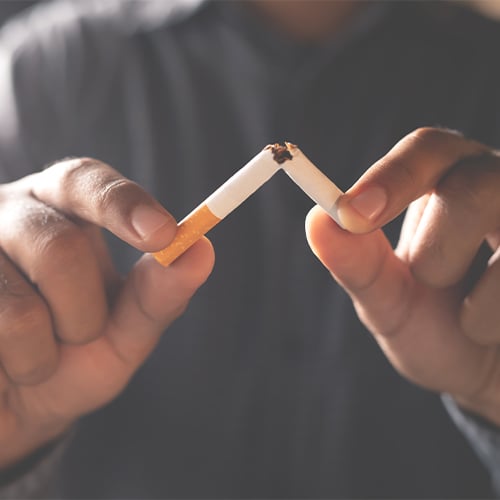When it comes to smoking, the bad effects outweigh the good. Read through this article about the hazards of cigarette smoking, along with handy tips on how you can quit the habit.
What Makes Smoking Bad
“Smoking is hazardous to your health”– this is a phrase that you’ll often hear or read in ads and health advisories. Yet, smoking remains to be a common habit. For many, it brings relief as it helps “calm nerves”. For some, it is simply part of a daily routine, and quitting is not seen in the horizon.
But it’s important to understand that smoking brings more harm than good. Cigarette smoke contains more than 4,000 chemicals, including more than 60 carcinogens (substances that may cause cancer). The harm that the smoker experiences is determined by their cumulative exposure to these chemicals. On one hand, carbon monoxide replaces oxygen in the blood, which can interfere with how various organs function in the body. On the other, tar is a sticky brown substance that coats the lungs, which may affect one’s breathing.
Carbon monoxide and tar, along with the other poisonous chemicals in tobacco can negatively impact your health in ways such as:
- Triggering lung diseases. Smoking can cause lung problems by damaging airways and air sacs.
- Developing problems for the heart. The chemicals in cigarette smoke make blood vessels thicker and narrow. This can lead to cardiovascular diseases including atherosclerosis, coronary heart disease and stroke.
- Smoking causes elevation in blood pressure and is a risk factor to stroke, a medical condition that can cause brain damage and death.
- Interfering quick immune response. Cigarette smoke can disrupt the balance in your body’s immune system, which affects immune response and may even lead to autoimmune conditions.
- Limiting movement. Carbon monoxide makes the heart work harder and faster. This makes exercise and even daily physical tasks challenging.
- Affecting fertility. Smoking can cause impotence and low sperm count. Studies have also found that women who smoke can have more difficulty in conceiving.
- Smoking is a risk factor for various types of cancer.
Smoking: A Bad Habit You Can Break
Quitting smoking is easier said than done; it can also be a different journey for everyone. While some may easily drop the habit, others will require significant effort to stop. To help you start (or keep with) your process of quitting, check out these suggestions.
Make a START Plan
As previously mentioned, not everyone can easily just drop a habit. What can work is to ease into your smoke-free days with a plan. A START plan is a more gradual approach to quitting and it involves the following steps.
- Set a quit date
- Tell family and friends of your plan to quit
- Anticipate and plan for possible challenges
- Remove cigarettes from your immediate environment
- Talk to your physician regarding withdrawal symptoms that you may experience
Identifying Triggers
Especially for long-time smokers who have made a daily routine with smoking, it helps to list down triggers that lead you to do the deed. There are four categories:
- Emotional triggers or when intense emotions cause you to smoke
- Pattern triggers or specific daily activities such as drinking coffee, driving, taking a quick break from work
- Social triggers or specific occasions including attending big events
- Withdrawal triggers or conditions that make you crave for a cigarette
Knowing your triggers helps you prepare action plans to avoid smoking.
Remember Your Why
For those who regularly interact with you? Keeping your Why in mind helps keep you on your journey to quitting.
Seek Professional Support
For expert medical advice, consult your physician or healthcare professional. They can recommend solutions that will tailor fit your health and lifestyle.
Initial attempts to stop smoking may be difficult. Researches have shown that most persons who eventually quit did several attempts before they finally succeeded. It is important to keep on trying because it’s worth it.
References:
https://www.medicalnewstoday.com/articles/10566
https://www.healthline.com/health/smoking/effects-on-body
https://www.medicalnewstoday.com/articles/322526
https://www.medicalnewstoday.com/articles/240820
https://www.helpguide.org/articles/addictions/how-to-quit-smoking.htm
https://www.healthline.com/health/how-to-quit-smoking#1
https://www.stroke.org.uk/sites/default/files/smoking_and_the_risk_of_stroke.pdf
https://smokefree.gov/challenges-when-quitting/cravings-triggers/know-your-triggers
https://vapingfacts.health.nz/vaping-to-quit-smoking/vaping-vs-other-ways-of-quitting.html








